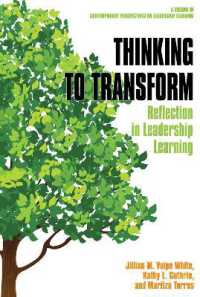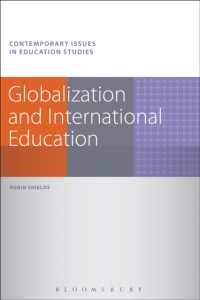- ホーム
- > 洋書
- > 英文書
- > Cinema / Film
Full Description
The apparent shift in power relations between the developed and developing world, along with the increasing emphasis that national and transnational organisations place on the role of 'soft power' in global foreign policy, has profound implications for global film culture. Focusing primarily on the BRICS countries (Brazil, Russia, India, China and South Africa), this innovative collection examines the diverse and often competing ways the group as a whole engages with film as a medium of artistic expression, and as a 'soft power' resource.
The contributors explore the wider implications for world cinema of its members' differing and dynamic positions in the global media landscape, and the book includes a comparative analysis by examining the post-imperial soft power of the UK at the time of Brexit.
Contents
Preface
Introduction: Film as Soft Power - Stephanie Dennison
1. Soft Power and Cinema: A Methodological Reflection and Some Chinese Inflections - Song Hwee Lim
2. Building BRICS: soft power and audio-visual relations in transnational context - Stephanie Dennison
3. The Global Animation Market: Opportunities for Developing Countries - Alessandra Meleiro
4. (Masha and) the Bear Diplomacy: Russian Soft Power and Non-Governmental Agency - Vlad Strukov
5. The Limits of Hollywood as an Instrument of Chinese Public Diplomacy and Soft Power - Chris Homewood
6. The Second World War, Soviet Sports, and Furious Space Walks: Soft Power and Nation Branding in the Putin 2.0 Era - Stephen M. Norris
7. Popular Geopolitics, Soft Power and Strategic Narratives in Viking (2016) and Guardians (2017) - Robert A. Saunders
8. Challenging Imagined Communities: 'Reversing the Gaze' of Soft Power and Community Film Culture: the Case of South Africa - Paul Cooke
9. New Myths for an Old Nation: Bollywood, Soft Power and Hindu Nationalism - Rachel Dwyer
10. Soft Power and National Cinema: James Bond, Great Britain and Brexit - Andrew Higson
Notes on Contributors







